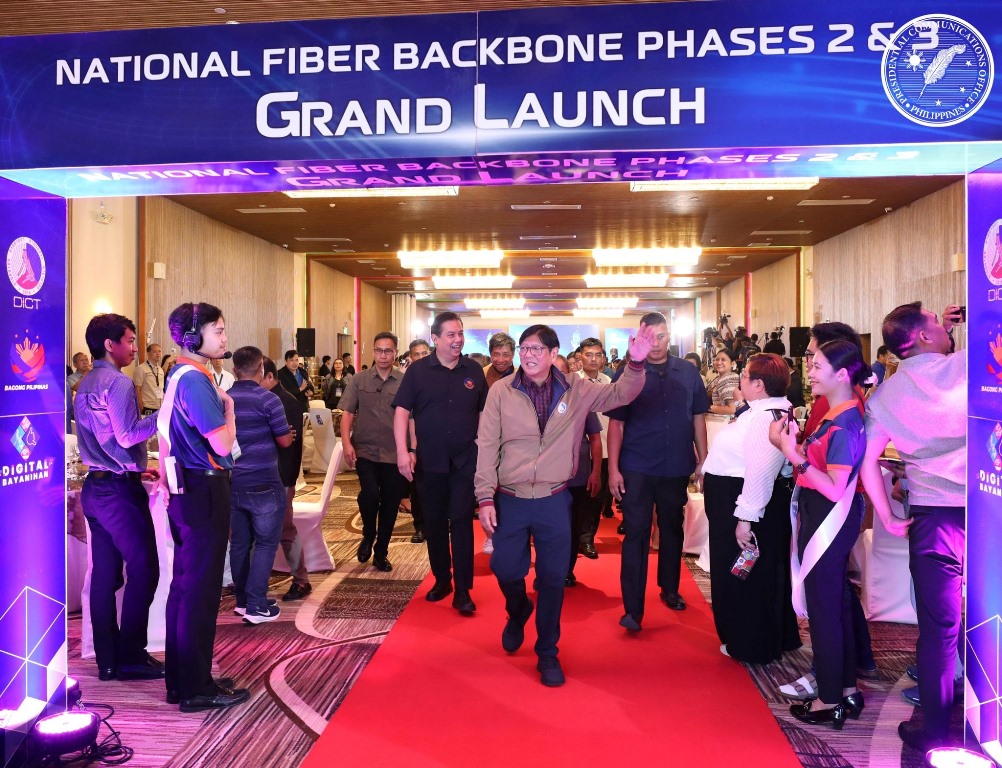
With internet access now a basic necessity for work, school, business, and daily life, President Ferdinand R. Marcos Jr. on Monday led the grand launch of the Phases 2 and 3 of the National Fiber Backbone (NFB) project, emphasizing the government’s push to deliver fast, reliable, and accessible internet to all Filipinos—especially those in far-flung and underserved communities.
Speaking at the event held at The Tropics in Palo, Leyte, President Marcos highlighted the importance of digital connectivity and officially launched the NFB project, which aims to expand and strengthen the country’s internet infrastructure for greater nationwide reach.
“Sa panahon ngayon, hindi na privilege ang pagkakaroon ng access sa mabilis na internet, ito ay pangangailangan na,” the President said. “Kailangan ito sa pag-aaral, sa trabaho, sa negosyo, at para mapanatili ang koneksyon sa mga mahal sa buhay.”
Under President Marcos’ Bagong Pilipinas campaign, enhancing public sector connectivity has become a central focus, designed to ensure inclusive access, leaving no Filipino behind.
While President Marcos acknowledged the unequal internet access across the country, the Chief Executive stressed that the government’s expansion of the NFB aims to bridge the digital divide, especially in Geographically Isolated and Disadvantaged Areas (GIDAs), where residents often travel long distances just to connect online.
Under Phases 2 and 3 of the NFB, approximately 1,800 kilometers of new fiber optic cable have been laid out, expanding the high-speed digital infrastructure to Cagayan Valley, CALABARZON, Bicol, Eastern Visayas, and Mindanao.
This builds on the success of Phase 1, which was launched in April 2024 and covered over 1,200 kilometers from Laoag, Ilocos Norte, to Quezon City.
Once completed, the project is expected to benefit over 600 government offices and improve connectivity for an estimated 17 million Filipinos.
Furthermore, President Marcos said that with government-owned infrastructure in place, the cost of operations for telcos and internet providers could decrease.
“Mas abot-kayang Internet, mas maraming Pilipino ang konektado,” the President said.
With faster internet, President Marcos said people will be able to access early weather warnings, apply for jobs, connect with family abroad, and even sell products online.
The President highlighted how improved connectivity allows access to digital learning resources, entrepreneurship tutorials, and real-time global news.
“Ito po ang tinatawag nating Digital Bayanihan. Ito ang sama-samang pagkilos ng pamahalaan, pribadong sektor, at bawat Pilipino para siguraduhing walang maiiwan sa digital world,” President Marcos said.
The NFB is a flagship initiative of the Department of Information and Communications Technology (DICT) aimed at establishing a secure and robust nationwide fiber optic network that will serve as the backbone of the country’s digital infrastructure. | PND

